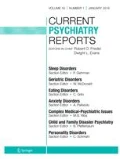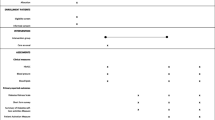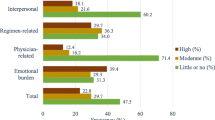Abstract
With the development of a measure of serious psychological distress (SPD) in 2002, more attention is being paid to the association of SPD with diabetes outcomes and processes of care. We review the literature on the relationship between SPD and diabetes processes of care and outcomes, as well as the literature on the relationship between specific mental health diagnoses and diabetes processes of care and outcomes during the 2010 to 2011 period. There is an extensive literature on the association of mental health diagnoses with diabetes outcomes, especially for depression. Because the Kessler scale measures a much broader range of mental health issues than any specific DSM-IV/Structured Clinical Interview for DSM Disorders diagnosis and is designed to assess SPD at the population level, additional research needs to be conducted both in clinical settings and using large administrative datasets to examine the association between SPD and diabetes outcomes and processes of care.
Similar content being viewed by others
References
Papers of particular interest, published recently, have been highlighted as: •• Of major importance
Kessler RC, Andrews G, Colpe LJ, et al. Short screening scales to monitor population prevalences and trends in non-specific psychological distress. Psychol Med. 2002;32:959–76.
•• Egede LE, Ellis C. Diabetes and depression: global perspectives. Diabetes Res Clin Pract. 2010 Mar; 87(3):302–12. This is a review article on the association of depression with poor metabolic control, higher complication rates, decreased quality of life, increased health care cost, increased disability, lost productivity, and increased risk of death.
Ali S, Stone MA, Peters JL, et al. The prevalence of co-morbid depression in adults with type 2 diabetes: a systematic review and meta-analysis. Diabet Med. 2006;23:1165–73.
Lustman PJ, Anderson RJ, Freedland KE, et al. Depression and poor glycemic control: a meta-analytic review of the literature. Diabetes Care. 2000;23:934–42.
Richardson LK, Egede LE, Mueller, Echols CL, Gebregziabher M. Longitudinal effects of depression on glycemic control in veterans with type 2 diabetes. Gen Hosp Psychiatry. 2008;30:509–14.
Gonzalez JS, Peyrot LA, McCarl EM, et al. Depression and diabetes treatment nonadherence: a meta-analysis. Diabetes Care. 2008;31:2398–403.
Egede LE. Effect of depression on self-management behaviors and health outcomes in adults with type 2 diabetes. Curr Diabetes Rev. 2005;1:235–43.
Lin EH, Katon M, Von Korff C, et al. Relationship of depression and diabetes self-care, medication adherence, and preventive care. Diabetes Care. 2004;27:2154–60.
Gonzalez JS, Safren E, Cagliero DJ, Wexler L, et al. Depression, self-care, and medication adherence in type 2 diabetes: relationships across the full range of symptom severity. Diabetes Care. 2007;30:2222–7.
de Groot M, Anderson R, Freedland KE, Clouse RE, Lustman PJ. Association of depression and diabetes complications: a meta-analysis. Psychosom Med. 2001;63:619–30.
Clouse RE, Lustman PJ, Freedland KE, et al. Depression and coronary heart disease in women with diabetes. Psychosom Med. 2003;65:376–83.
Egede LE. Diabetes, major depression, and functional disability among U.S. adults. Diabetes Care. 2004;27:421–8.
Egede LE. Effects of depression on work loss and disability bed days in individuals with diabetes. Diabetes Care. 2004;27:1751–3.
Eren I, Erdi O, Sain M. The effect of depression on quality of life of patients with type II diabetes mellitus. Depress Anxiety. 2008;25:98–106.
Le TK, Able SL, Lage MJ. Resource use among patients with diabetes, diabetic neuropathy, or diabetes with depression. Cost Eff Resour Alloc. 2006;4:18.
Finkelstein EA, Bray JW, Chen H, et al. Prevalence and costs of major depression among elderly claimants with diabetes. Diabetes Care. 2003;26:415–20.
Egede LE, Zheng D, Simpson K. Comorbid depression is associated with increased health care use and expenditures in individuals with diabetes. Diabetes Care. 2002;25:464–70.
Katon W, Fan MY, Unutzer J, et al. Depression and diabetes: a potentially lethal combination. J Gen Intern Med. 2008;23:1571–5.
Egede LE, Nietert PJ, Zheng D. Depression and all-cause and coronary heart disease mortality among adults with and without diabetes. Diabetes Care. 2005;28:1339–45.
Campayo A, Gómez-Biel CH, Lobo A. Diabetes and depression. Curr Psychiatry Rep. 2011;13:26–30.
Nouwen A, Nefs G, Caramlau l, et al. Prevalence of depression in individuals with impaired glucose metabolism or undiagnosed diabetes: a systematic review and meta-analysis of the European Depression in Diabetes (EDID) Research Consortium. Diabetes Care. 2011;34:752–62.
Katon W, Lin E, Williams L, et al. Comorbid depression is associated with an increased risk of dementia diagnosis in patients with diabetes: a prospective cohort study. J Gen Intern Med. 2010;25:423–9.
Lin E, Rutter C, Katon W, et al. Depression and advanced complications of diabetes: a prospective cohort study. Diabetes Care. 2010;33:264–9.
Heckbert S, Rutter C, Oliver M, et al. Depression in relation to long-term control of glycemia, blood pressure, and lipids in patients with diabetes. J Gen Intern Med. 2010;25:524–9.
Egede L, Osborn C. Role of motivation in the relationship between depression, self-care, and glycemic control in adults with type 2 diabetes. Diabetes Educ. 2010;36:276–83.
Egede L, Grubaugh A, Ellis C. The effect of major depression on preventive care and quality of life among adults with diabetes. Gen Hosp Psychiatry. 2010;32:563–9.
Dismuke C, Egede L. Association between major depression, depressive symptoms and personal income in US adults with diabetes. Gen Hosp Psychiatry. 2010;32:484–91.
Bryan C, Songer T, Brooks M, et al. The impact of diabetes on depression treatment outcomes. Diabetes Care. 2010;33:1034–6.
Pan A, Lucas M, Sun Q, et al. Bidirectional association between depression and type 2 diabetes mellitus in women. Arch Intern Med. 2010;22:1884–18891.
Pan A, Lucas M, Sun Q, et al. Increased mortality risk in women with depression and diabetes mellitus. Arch Gen Psychiatry. 2011;68:42–50.
Sorkin D, Ngo-Metzger Q, Billimek J, et al. Underdiagnosed and undertreated depression among racially/ethnically diverse patients with type 2 diabetes. Diabetes Care. 2011;34:598–600.
Osborn C, Trott H, Buchowski M, et al. Racial disparities in the treatment of depression in low-income persons with diabetes. Diabetes Care. 2010;33:1050–4.
Ell K, Katon W, Xie B et al. One-year postcollaborative depression care trial outcomes among predominantly Hispanic diabetes safety net patients. Gen Hosp Psychiatry 2011, Jul 18 Epub ahead of print.
Ell K, Katon W, Xie B, et al. Collaborative care management of major depression among low-income, predominantly Hispanic subjects with diabetes: a randomized controlled trial. Diabetes Care. 2010;33:706–13.
McDade-Montez E, Watson D: Examining the potential influence of diabetes on depression and anxiety symptoms via multiple sample confirmatory factor analysis. Ann Behav Med 2011, Aug 11 Epub ahead of print.
Auila N, Davies M, Skinner T, et al. The association between anxiety and measures of glycaemia in a population-based diabetes screening programme. Diabet Med. 2011;28:785–8.
Trento M, Raballo M, Sicuro J et al: A cross-sectional survey of depression, anxiety, and cognitive function in patients with type 2 diabetes. Acta Diabetol 2011, Mar 27 Epub ahead of print.
Labad J, Price J, Strachan M, et al. Symptoms of depression but not anxiety are associated with central obesity and cardiovascular disease in people with type 2 diabetes: the Edinburg Type 2 Diabetes Study. Diabetologia. 2010;53:467–71.
Miller S, Mancuso C, Boutin-Foster C, et al. Associations between posttraumatic stress disorder and hemoglobin A1(C) in low-income minority patients with diabetes. Gen Hosp Psychiatry. 2011;33:116–22.
Boyko E, Jacobson I, Smith B, et al. Risk of diabetes in U.S. military service members in relation to combat deployment and mental health. Diabetes Care. 2010;33:1771–7.
Scott-Tilley D, Tilton A, Sandel M. Biologic correlates to the development of post-traumatic stress disorder in female victims of intimate partner violence: implications for practice. Perspect Psychiatr Care. 2010;46:26–36.
Hsu J, Chien I, Lin C, Chou Y, Chou P. Incidence of diabetes in patients with schizophrenia: a population-based study. Can J Psychiatry. 2011;56:19–26.
Schoepf D, Potluri R, Uppal H et al: Type-2 diabetes mellitus in schizophrenia: increased prevalence and major risk factor of excess mortality in a naturalistic 7-year follow-up. Eur Psychiatry 2011, May 12 Epub ahead of print.
Becker T, Hux J. Risk of acute complications of diabetes among people with schizophrenia in Ontario, Canada. Diabetes Care. 2011;34:398–402.
Bresee L, Majumdar S, Patten S, Johnson J. Diabetes, cardiovascular disease, and health care use in people with and without schizophrenia. Eur Psychiatry. 2011;33:327–32.
Kreyenbuhl J, Dixon L, McCarthy, et al. Does adherence to medications for type 2 diabetes differ between individuals with vs without schizophrenia? Schizophr Bull. 2010;36:428–35.
Fisher L, Glasgow R, Mullan J, Skaff M, Polonsky W. Development of a brief diabetes distress screening instrument. Ann Fam Med. 2008;6:246–52.
Ting R, Nan H, Yu M, et al. Diabetes-related distress and physical and psychological health in Chinese type 2 diabetic patients. Diabetes Care. 2011;34:1094–6.
Fisher L, Glasgow R, Strycker L. The relationship between diabetes distress and clinical depression with glycemic control among patients with type 2 diabetes. Diabetes Care. 2010;33:1034–6.
Fisher L, Mullan J, Arean P. Diabetes distress but not clinical depression or depressive symptoms is associated with glycemic control in both cross-sectional and longitudinal analyses. Diabetes Care. 2010;33:23–8.
Zagarins S, Allen N, Garb J, Welch G: Improvement in glycemic control following a diabetes education intervention is associated with change in diabetes distress but not change in depressive symptoms. J Behav Med 2011, Jun 21 Epub ahead of print.
Kessler R, Barker P, Colpe L, et al. Screening for serious mental illness in the general population. Arch Gen Psychiatry. 2003;60:184–9.
Kessler R, Green J, Gruber M et al: Screening for serious mental illness in the general population with the K6 screening scale: results from the WHO World Mental Health (WMH) survey initiative. Int J Methods Psychiatr Res 2010, Suppl 1:4–22.
Arnaud B, Malet L, Teissedre F, et al. Validity study of Kessler’s psychological distress scales conducted among patients admitted to French emergency department for alcohol consumption-related disorders. Alcohol Clin Exp Res. 2010;34(7):1235–45.
Mitchell C, Beals J. The utility of the Kessler Screening Scale for Psychological Distress (K6) in two American Indian communities. Psychol Assess. 2011;23:752–61.
Krieger N, Kosheleva A, Waterman P, Chen J, Konen K. Racial discrimination, psychological distress, and self-rated health among US-born and foreign-born black Americans. Am J Public Health. 2011;101:1704–13.
McMillan K, Enns M, Asmundson G, Sareen J. The association between income and distress, mental disorders, and suicidal ideation and attempts: findings from the collaborative psychiatric epidemiology surveys. J Clin Psychiatry. 2010;71:1168–75.
Kessler R, Galea S, Jones R. Mental illness and suicidality after Hurricane Katrina. Bull World Health Organ. 2006;84:930–9.
•• Dismuke C, Egede L: Association of serious psychological distress with health services expenditures and utilization in a national sample of US adults. Gen Hosp Psychiatry 2011, 33:311–317. SPD is associated with higher health service utilization and costs in the US population.
Pirraglia P, Hampton J, Rosen A, Witt W. Psychological distress and trends in healthcare expenditures and outpatient care. Am J Manag Care. 2011;17:319–28.
•• Li C, Ford E, Zhao G et al: Association between diagnosed diabetes and serious psychological distress among U.S. adults: the Behavioral Risk Factor Surveillance System, 2007. Int J Public Health 2009, 54:43–51. Crude prevalence of SPD among adults with diabetes is twice as high for those without diabetes, which may be due to excessive rates of cardiovascular risks.
•• Li C, Ford E, Zhao G et al: Undertreatment of mental health problems in adults with diagnosed diabetes and serious psychological distress: the behavioral risk factor surveillance system 2007. Diabetes Care 2010, 33:1061–1064. Comorbid psychological distress in individuals with diabetes is associated with a lower rate of undertreatment for mental health problems than in those without diabetes.
Williams S, Haskard-Zolnierek K, Banta J, et al. Serious psychological distress and diabetes among California adults. Int J Psychiatry Med. 2010;40:233–45.
Dunbar J, Reddy P, Davis-Lameloise N, et al. Depression: an important comorbidity with metabolic syndrome in a general population. Diabetes Care. 2008;31:2368–73.
Centers for Disease Control and Prevention (CDC). Serious psychological distress among persons with diabetes-New York City, 2003. MMWR Morb Mortal Wkly Rep. 2004;53:1089–92.
Acknowledgments
The authors acknowledge and appreciate the resources provided by the Center for Disease Prevention and Health Interventions for Diverse Populations HSR&D program (grant REA 08–261) and the Ralph H. Johnson Veterans Affairs Medical Center. The views expressed in this article are those of the authors and do not necessarily represent the views of the Department of Veterans Affairs.
Disclosure
No potential conflicts of interest relevant to this article were reported.
Author information
Authors and Affiliations
Corresponding author
Rights and permissions
About this article
Cite this article
Egede, L.E., Dismuke, C.E. Serious Psychological Distress and Diabetes: A Review of the Literature. Curr Psychiatry Rep 14, 15–22 (2012). https://doi.org/10.1007/s11920-011-0240-0
Published:
Issue Date:
DOI: https://doi.org/10.1007/s11920-011-0240-0




